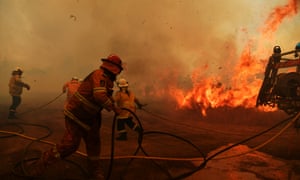It’s been a devastating week of unprecedented bushfires for New South Wales, Queensland and other states.
Some people are still fighting to save their homes, others are picking up the pieces after fires destroyed their properties and figuring out how to rebuild, and countless others are anxiously watching the fire warnings and preparing to evacuate.
While the numbers roll in to show that these fires are unprecedented –
more than 1m hectares have burned in NSW alone, and it’s not even
summer yet – fire authorities are warning that the worst is yet to come.Some people are still fighting to save their homes, others are picking up the pieces after fires destroyed their properties and figuring out how to rebuild, and countless others are anxiously watching the fire warnings and preparing to evacuate.
As I watch the story unfold – the destroyed houses, the traumatised people, the exhausted firefighters, the dead and injured wildlife, livestock and pets – one thing is abundantly clear to me: we are in a new era of unprecedented bushfire danger and we are not prepared.
Climate change has aggravated the catastrophic fire conditions that have torn through NSW and Queensland this week. Record-breaking drought, record-breaking heat, and very dry fuels and soils are a key part of why these bushfires are so deadly.
"You can only do prescribed burnings when temperatures are low, humidity is high, and winds aren’t too strong"
Hazard reduction involves removing vegetation, creating fire breaks and prescribed burning. It is an important tool for fire agencies and land managers but prescribed burning can be a high-risk strategy.
For obvious reasons, you can only do prescribed burnings when temperatures are low, humidity is high and winds aren’t too strong. But since it’s hot, dry and windy for more and more months of the year, leading to elevated fire danger, the window for safe burning is shrinking dramatically.
Our new bushfire reality is also incredibly demanding in terms of resources. There has been little reprieve for firefighters, even with help from interstate crews. Our firefighting resources have been stretched to the point where we’re now asking firefighters in other countries to join us in the battle.
And again, I stress: we are not even in summer yet. I would bet that most of us are in no hurry to get there, since the seasonal forecast predicts high temperatures and low rainfall – a recipe for extremely dangerous bushfire conditions.
It is clear to me, and it should be clear to anyone whose job it is to keep Australians safe, that we need to step up how we resource fire and emergency services in this new era of higher bushfire danger, and we need to tackle the root cause of this escalating crisis: climate change and the burning of fossil fuels.
The best time to have taken these steps was decades ago when climate scientists first started issuing warnings that burning coal, oil and gas was producing greenhouse gas emissions and fuelling dangerous climate change.
The second best time would have been April, when senior emergency leaders from every Australian state and territory came together to warn the federal government that climate change was worsening bushfire danger in our country and that we were not prepared.
Unfortunately, successive governments have largely dismissed or ignored these warnings. Even today, we have people disputing the evidence or spreading deliberate misinformation.
There’s no more time to waste. The only appropriate time to heed the warnings of climate scientists, of emergency services leaders and of the growing numbers of concerned Australians, is right now.
Let us master this crisis by increasing the capacity of fire and emergency services to prevent and respond to a growing number of climate emergencies and disasters. Let us work together to help communities prepare for and recover from these catastrophic events when they do happen.
Let us stop this crisis from getting worse, by keeping coal, oil and gas in the ground. We can’t afford to dump more carbon pollution into the atmosphere from burning fossil fuels. And we don’t need to – not when we know that investing in renewable energy can make us a thriving society with good jobs and a strong economy.
Let’s choose our people over coal corporation profits. Let’s choose our fireys over fossil fuels.
Let’s respond to this bushfire crisis like the climate change emergency it is.
• Ken Thompson is the former deputy commissioner of NSW Fire and Rescue

No comments:
Post a Comment